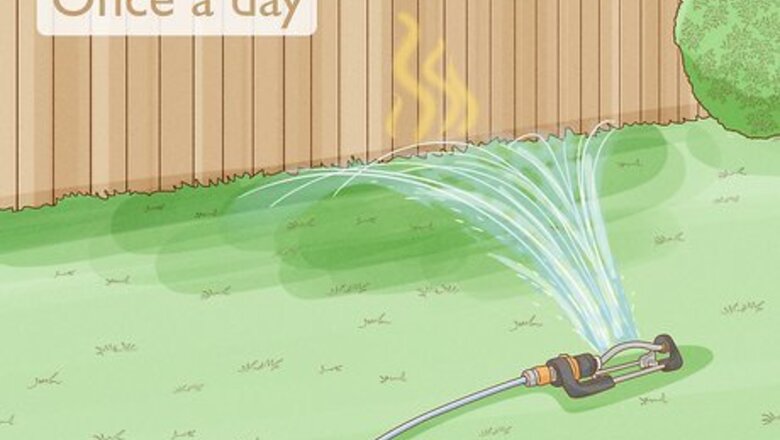
views
Natural Surfaces
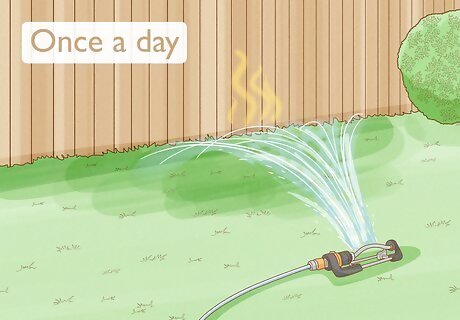
Dilute the urine with water on soil or grass. Surprisingly, the most effective way to get rid of urine on soil or grass is to dilute it with water over time. Point an oscillating sprinkler toward the area of the yard that your animals use the most, and turn it on at least once a day. After a couple of days, you’ll notice that the urine smell has decreased (and it may even go away). If water isn’t quite cutting it, add a little bit of dish soap. Not only will the water dilute the urine, but it will allow it to slowly sink into the soil, too.
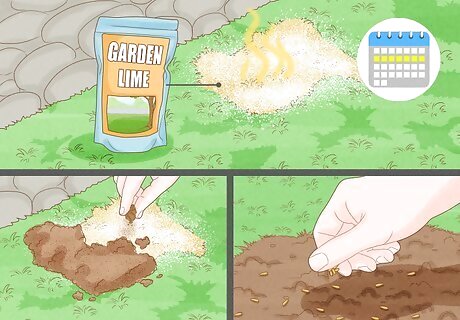
Sprinkle garden lime on stinky patches of your yard. If water isn’t cutting it or you need a solution fast, head to the garden supply store and pick up a package of garden lime. Sprinkle the stinky patches with lime, then get the lime damp with a hose. Let the lime sit for a week, then cover the patches up with top soil. If you have any dead patches of grass in your yard from urine, you can sprinkle grass seed on top of the topsoil to reseed the area.
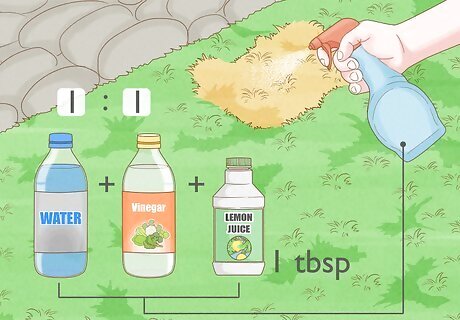
Mix lemon juice with vinegar for a natural solution. In a spray bottle, mix a 1:1 ratio of water and white vinegar. Add 1 tsp (4.9 mL) of lemon juice to remove odor and get rid of the urine smell. Mix the ingredients together, then spritz the urine-infested areas with your mixture once a day. If cat urine is your issue, try this method—not only will it get rid of the urine smell, but citrus deters cats and can help keep them out of your yard.
Man Made Surfaces
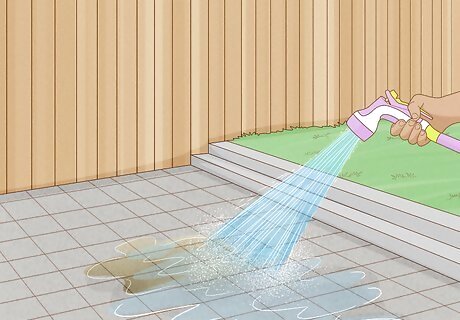
Use water if you can get to the urine quickly. If you just noticed a urine spot and it’s still wet, grab a hose or a watering can and wash the urine away. It’s especially important to work fast on porous surfaces, like concrete, so you can remove the urine before it soaks into the ground. If it’s been a few hours (or a few days), water probably won’t be enough to get rid of the urine smell.
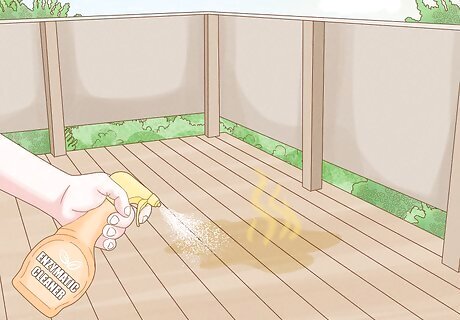
Go for an enzymatic cleaner on wood. Enzymatic cleaners are usually the best choice for cleaning up urine. The enzymes in the cleaner speed up the biological process of the urine breaking down, which gets rid of the smell faster. Head to your local pet supply store and buy a bottle of enzymatic cleaner, then spray it onto your deck or patio. These are sometimes called commercial odor removers. Just make sure they say “enzymes” or “enzymatic” somewhere on the bottle.
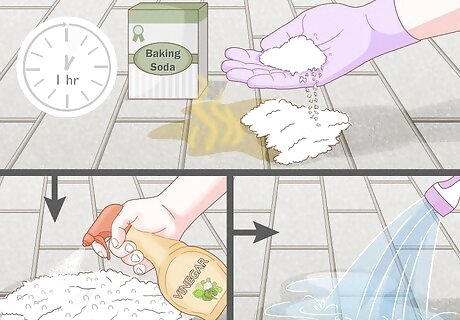
Use baking soda on porous surfaces. For concrete, enzymatic cleaners might not be enough. Cover the affected area with a thick layer of baking soda (the more, the better). Let the baking soda sit for 1 hour to really absorb the urine smell. Then, pour white vinegar over the area to neutralize the baking soda and get rid of the urine. Don’t worry if it starts to bubble and fizz—that means it’s working! After you're done, rinse the area with water.
Outdoor Furniture
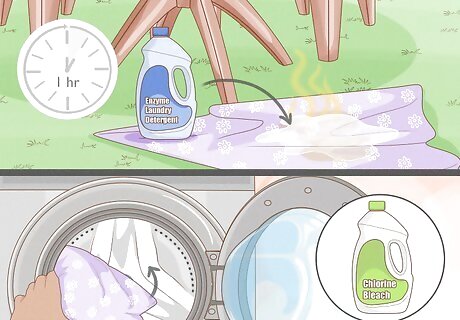
Use an enzyme laundry detergent on fabric furniture. Dab the urine-stained area with warm water, then add a thin layer of enzymatic laundry detergent on top. Let it soak for up to 1 hour, then throw the fabric into your washing machine. If you can, use chlorine bleach to remove all traces of the urine and completely clean your fabric furniture cover. Check the tag on the inside of the fabric furniture to see whether or not you can use bleach. If you can’t, just wash it using normal laundry detergent.
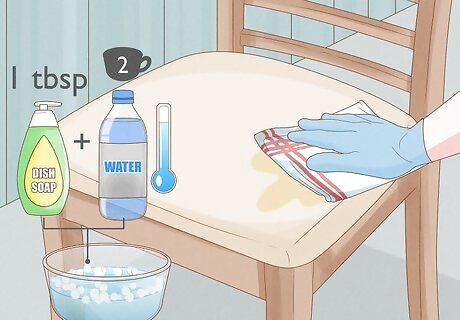
Try liquid dish soap on upholstery. If you can’t remove the fabric from your furniture to wash it, mix 1 US tbsp (15 mL) of dish soap with 2 cups (470 mL) of cool water. Dip a cloth into the cleaning solution, then gently blot the urine stain with it. Use another clean cloth to blot the liquid until all of it is absorbed. Keep adding cleaning solution and blotting it up until the urine is gone. You’ll probably have to do this process 2 or 3 times before the urine stain is completely gone. If the stain is still there, add a few drops of hydrogen peroxide and 2 drops of ammonia. Then, sponge the area with cold water and blot it dry.
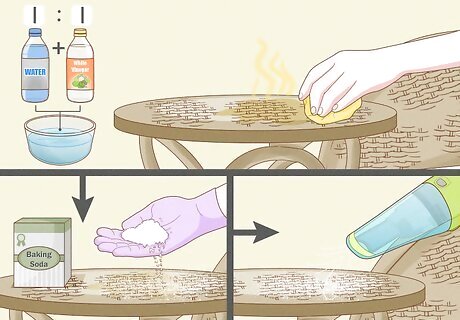
Use water and vinegar on wicker furniture. Mix together a 1:1 ratio of water and white vinegar, then dip a sponge or a cloth into the mixture. Scrub your wicker furniture down, focusing on the urine spots. Sprinkle the area with baking soda to neutralize the odor, then let everything dry. Vacuum up the baking soda to remove it and the urine smell. Wicker furniture is prone to mold and mildew, so make sure it’s thoroughly dry before storing it.
Prevention
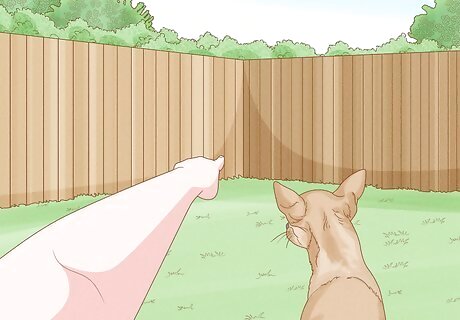
Train your animals to pee on grass or soil. Urine soaks into grass and soil much easier than it does on concrete or a deck. If you haven’t already, try to train your animals (especially your dogs) to pee on the grassy or dirt parts of your lawn. It might be helpful to add a marking post where you want your animals to go, like a bird bath or a lawn ornament. Then, praise your animals when they go in the right spot. Training like this usually works best when your animals are young, but even older animals can learn new rules. If training doesn’t work, consider putting in a fenced dog run. That way, your animals can only access a certain part of the yard when they need to pee.
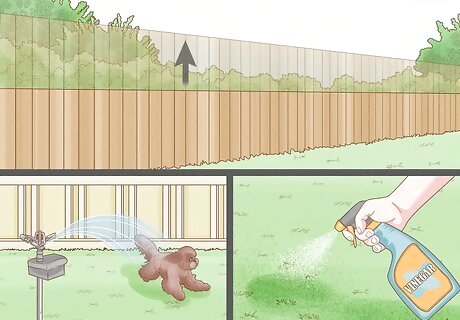
Keep stray animals out of your yard. If your animals aren’t the problem, there are ways to keep stray and neighbor animals off your lawn. For cats, you can try adding a tall fence or using motion-activated sprinklers to keep them away from your property. For dogs, try spraying your yard with baking soda or vinegar to deter dogs and keep them off your lawn. If your neighbor’s animals are the problem, try chatting with them to see what you both can do together to keep their animals off your lawn.
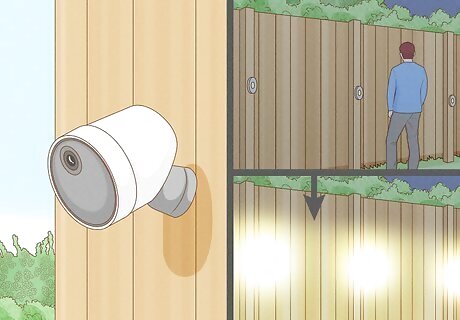
Use cameras and lights to keep people from peeing on your property. If humans are the problem, try to make your area an unappealing place to pee in. Most people look for a dark, secluded spot to urinate when they’re out and about. Instead, make your area bright with lights, and put up cameras so people are afraid of getting caught. Add a sign that says “Smile for the cameras!” so people know they’re being filmed. Hopefully, they’ll move onto somewhere else to relieve their bladders. You could also put up signs to encourage patrons to speak up if they see someone using your building as a urinal.
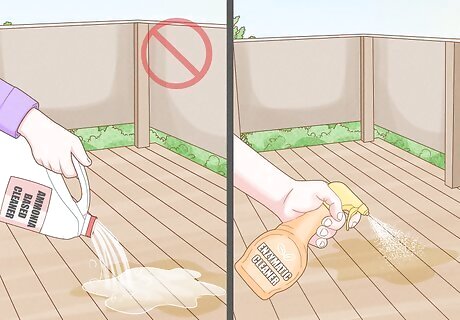
Avoid using any ammonia-based cleaners. Ammonia carries a strong scent, which can actually be counterproductive to your cleaning efforts. If an animal smells a strong chemical smell, they may try to mask it with their own urine. Stick to enzymatic cleaners that aren’t super smelly to discourage your animals from peeing in the same spot.



















Comments
0 comment